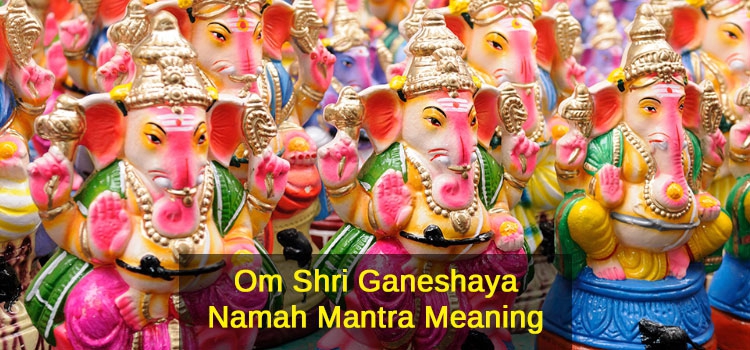Om Shri Ganeshaya Namah Mantra
Greatness of Lord Ganesha
Ganesha is the divine son of Lord Shiva and Goddess Parvati. He is hailed as the Lord of auspiciousness, remover of obstacles and harbinger of success, and is both loved and venerated. He is a unique God with an elephant face, but also has a primordial form with a human head. He is celebrated as a hero of strength, as a happy dancer, as a sweet child and many more, and is believed to represent aspects like good health, wisdom, wealth and happiness. It is a widely followed custom to seek his blessings while starting any endeavor, undertaking a venture, making a new beginning or performing any auspicious event or ritual. Ganesha is essentially a simple God, who is worshipped with faith by commoners and the elite, alike. His veneration is done from very ancient times, and Gaanapathyam, the Ganesha worship, was established by saint Adi Shankara, as one of the six fundamental forms of worship in Hindu religion.
What his Form Symbolizes?
Ganesha is indeed an amazing deity, whose form itself conveys profound significance. His head portion is said to denote Atma, the eternal soul that remains as the ultimate reality; while the body part represents the existential aspect or Maya, the illusion. The elephant head is also said to signify wisdom; his trunk, the cosmic sound Om; and his 2 tusks, emotion and wisdom. While he is believed to corner all difficulties with the noose in his left hand, he is also said to clear impediments and guide people towards higher consciousness, with the help of the elephant goad that he holds in his upper right hand.
This pot-bellied Lord is also hailed in a host of names such as Vinayaka, Vigneshwara, Gajanana, Lambodhara, Ekadantha and Vignaharta, while people, especially in the state of Tamil Nadu address him fondly as Pillaiyar. Devotees pray to him seeking buddhi, the intellect and siddhi, success and these two, that is, Buddhi and Siddhi, have even been depicted at some places as the consorts of this God, who is otherwise considered, a celibate. Somewhere else, he is also worshipped as the father of two sons called by the name Shubh and Labh, which are nothing but his own blessings, auspiciousness and gains, respectively.

Significance of Ganesha’s advent
Ganesha is an extraordinary Lord and even the story of his origin bears out this fact. He is indeed the dear son of the divine couple Shiva–Parvati, but was actually created by the Goddess from the clay that she took out from her own body. It was, however, Shiva who was responsible for his elephant-head. Ganesha thus remains as the divinity that emerged when Shiva, the matter combined with Sakthi, the energy. It is also said that the integration of the universal father and mother led to the advent of Ganapati, who represents the universal sound Om and Skanda, who represents divine light. Ganesha is said to have incarnated on Chaturthi, the 4th lunar day of Shukla Paksha, the waxing phase of the Moon during the Hindu month Bhadrapada that corresponds to the Tamil month Aavani (August–September). This day is well-celebrated all over the country as Ganesh Chaturthi.
Ganesha Mantra
The mantra invoking the elephant-faced God is as simple as the God himself and it is -
‘Om Shri Ganeshaya Namah’
This simply translates to ‘Lord Ganesha, I offer prayers to you’.
Meaning of Ganesha Mantra
The invocation begins with the word ‘Om’, whose sound vibration is eternal, remains as the underlying substance of all living beings and non-living things of the universe, and resonates through every minute particle of an individual physical frame and also of the vast universe. Hailed as the universal sound, it is said to represent the fundamental aspects of creation, sustenance and liberation, and also the divine healing power. The next word ‘Shri’ actually denotes ‘Shrim’, which is the beej mantra, the fundamental invocation. The term ‘Ganeshaya’, apart from taking the name of the Lord, also highlights the notion of ‘beej’. The final word ‘Namah’ is the respectful salutation, meaning ‘I bow to you’.
Mantra Chanting Benefits
Chanting this powerful mantra accurately and with faith can get for the devotees the immense blessings of the benevolent Lord. These can clear obstacles and bestow people with a focused mind, wisdom, health, prosperity, good fortune, success and all-round well-being.



















